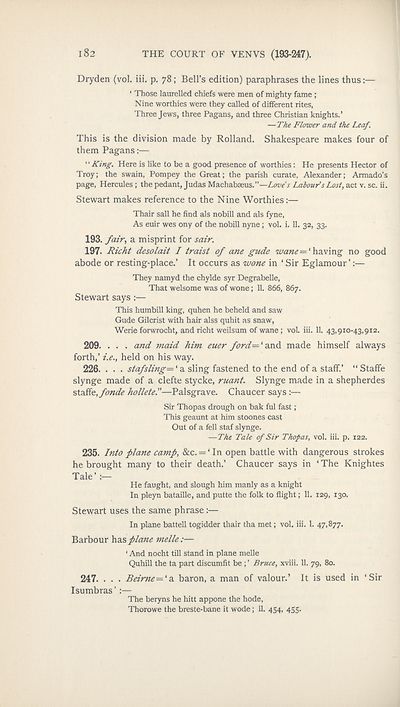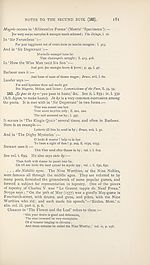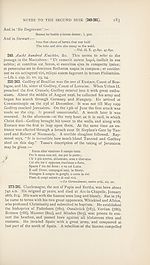Scottish Text Society publications > Old series > Treatise callit The court of Venus
(224) Page 182
Download files
Complete book:
Individual page:
Thumbnail gallery: Grid view | List view

THE COURT OF VENVS (193-247).
182
Dryden (vol. iii. p. 78; Bell’s edition) paraphrases the lines thus:—
‘ Those laurelled chiefs were men of mighty fame ;
Nine worthies were they called of different rites,
Three Jews, three Pagans, and three Christian knights.’
— The Flower and the Leaf.
This is the division made by Holland. Shakespeare makes four of
them Pagans:—
'' King. Here is like to be a good presence of worthies: He presents Hector of
Troy; the swain, Pompey the Great; the parish curate, Alexander; Armado’s
page, Hercules ; the pedant, Judas Machabseus.”—Love's Labour's Lost, act v. sc. ii.
Stewart makes reference to the Nine Worthies :—
Thair sail he find als nobill and als fyne,
As euir wes ony of the nobill nyne ; vol. i. 11. 32, 33.
193. fair, a misprint for sair.
197. Richt desolait I traist of ane gude wane — 1 having no good
abode or resting-place.’ It occurs as wane in ‘ Sir Eglamour’:—
They namyd the chylde syr Degrabelle,
That welsome was of wone; 11. 866, 867.
Stewart says :—
This humbill king, quhen he beheld and saw
Gude Gilcrist with hair alss quhit as snaw,
Werie forwrocht, and richt weilsum of wane ; vol. iii. 11. 43,910-43,912.
209. . . . and maid him euer ford— ‘ and made himself always
forth,’ i.e., held on his way.
226. . . . stafsling— ‘ a sling fastened to the end of a staff.’ “ Staffe
slynge made of a clefte stycke, ruant. Slynge made in a shepherdes
fonde holletef—Palsgrave. Chaucer says :—
Sir Thopas drough on bak ful fast;
This geaunt at him stoones cast
Out of a fell staf slynge.
— The Tale of Sir Thopas, vol. iii. p. 122.
235. Into plane camp, &c. = ‘ In open battle with dangerous strokes
he brought many to their death.’ Chaucer says in ‘The Knightes
Tale’:—
He faught, and slough him manly as a knight
In pleyn bataille, and putte the folk to flight; 11. 129, 130.
Stewart uses the same phrase:—
In plane battell togidder thair tha met; vol. iii. 1. 47,877.
Barbour has plane melle :—
1 And nocht till stand in plane melle
Quhill the ta part discumfit be ; ’ Bruce, xviii. 11. 79, 80.
247. . . . Beirne='2i baron, a man of valour.’ It is used in ‘Sir
Isumbras’:—
The beryns he hitt appone the hode,
Thorowe the breste-bane it wode; 11. 454, 455.
182
Dryden (vol. iii. p. 78; Bell’s edition) paraphrases the lines thus:—
‘ Those laurelled chiefs were men of mighty fame ;
Nine worthies were they called of different rites,
Three Jews, three Pagans, and three Christian knights.’
— The Flower and the Leaf.
This is the division made by Holland. Shakespeare makes four of
them Pagans:—
'' King. Here is like to be a good presence of worthies: He presents Hector of
Troy; the swain, Pompey the Great; the parish curate, Alexander; Armado’s
page, Hercules ; the pedant, Judas Machabseus.”—Love's Labour's Lost, act v. sc. ii.
Stewart makes reference to the Nine Worthies :—
Thair sail he find als nobill and als fyne,
As euir wes ony of the nobill nyne ; vol. i. 11. 32, 33.
193. fair, a misprint for sair.
197. Richt desolait I traist of ane gude wane — 1 having no good
abode or resting-place.’ It occurs as wane in ‘ Sir Eglamour’:—
They namyd the chylde syr Degrabelle,
That welsome was of wone; 11. 866, 867.
Stewart says :—
This humbill king, quhen he beheld and saw
Gude Gilcrist with hair alss quhit as snaw,
Werie forwrocht, and richt weilsum of wane ; vol. iii. 11. 43,910-43,912.
209. . . . and maid him euer ford— ‘ and made himself always
forth,’ i.e., held on his way.
226. . . . stafsling— ‘ a sling fastened to the end of a staff.’ “ Staffe
slynge made of a clefte stycke, ruant. Slynge made in a shepherdes
fonde holletef—Palsgrave. Chaucer says :—
Sir Thopas drough on bak ful fast;
This geaunt at him stoones cast
Out of a fell staf slynge.
— The Tale of Sir Thopas, vol. iii. p. 122.
235. Into plane camp, &c. = ‘ In open battle with dangerous strokes
he brought many to their death.’ Chaucer says in ‘The Knightes
Tale’:—
He faught, and slough him manly as a knight
In pleyn bataille, and putte the folk to flight; 11. 129, 130.
Stewart uses the same phrase:—
In plane battell togidder thair tha met; vol. iii. 1. 47,877.
Barbour has plane melle :—
1 And nocht till stand in plane melle
Quhill the ta part discumfit be ; ’ Bruce, xviii. 11. 79, 80.
247. . . . Beirne='2i baron, a man of valour.’ It is used in ‘Sir
Isumbras’:—
The beryns he hitt appone the hode,
Thorowe the breste-bane it wode; 11. 454, 455.
Set display mode to: Large image | Zoom image | Transcription
Images and transcriptions on this page, including medium image downloads, may be used under the Creative Commons Attribution 4.0 International Licence unless otherwise stated. ![]()
| Publications by Scottish clubs > Scottish Text Society publications > Old series > Treatise callit The court of Venus > (224) Page 182 |
|---|
| Permanent URL | https://digital.nls.uk/106997299 |
|---|
| Description | A collection of over 100 Scottish texts dating from around 1400 to 1700. Most titles are in Scots, and include editions of poetry, drama, and prose by major Scottish writers such as John Barbour, William Dunbar, Gavin Douglas, and George Buchanan. Edited by a key scholarly publisher of Scotland's literary history, and published from the late 19th century onwards by the Scottish Text Society. Available here are STS series 1-3. |
|---|

